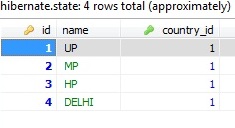Example of @MapKey in Hibernate
May 23, 2013
In hibernate, @MapKey is used when the entity is returning Map. Map is key value pair. So to decide what should be the key of map, @MapKey is used. In our example Country entity is returning the Map of states and here the key of map has been set to id of sate by @MapKey. The syntax is:
@MapKey(name="column name")
Country.java
package com.concretepage.persistence;
import java.io.Serializable;
import java.util.Map;
import javax.persistence.CascadeType;
import javax.persistence.Column;
import javax.persistence.Entity;
import javax.persistence.Id;
import javax.persistence.JoinColumn;
import javax.persistence.MapKey;
import javax.persistence.OneToMany;
@Entity
public class Country implements Serializable {
private static final long serialVersionUID = 1L;
@Id
@Column(name="id")
private int id;
@Column(name="name")
private String name;
@OneToMany(cascade=CascadeType.ALL)
@JoinColumn(name="country_id")
@MapKey(name="id")
private Map<Integer,State> states;
public Country(int id,String name,Map<Integer,State> states){
this.id=id;
this.name=name;
this.states=states;
}
public Country(){
}
public int getId() {
return id;
}
public void setId(int id) {
this.id = id;
}
public String getName() {
return name;
}
public void setName(String name) {
this.name = name;
}
public Map<Integer,State> getStates() {
return states;
}
public void setStates(Map<Integer,State> states) {
this.states = states;
}
}
State.java
package com.concretepage.persistence;
import javax.persistence.Column;
import javax.persistence.Entity;
import javax.persistence.Id;
import javax.persistence.Table;
@Entity
@Table(name = "state")
public class State {
@Id
@Column(name = "id")
private int id;
@Column(name = "name")
private String name;
public State(int id,int countryId,String name){
this.id=id;
this.name=name;
}
public State(){}
public String getName() {
return name;
}
public void setName(String name) {
this.name = name;
}
public int getId() {
return id;
}
public void setId(int id) {
this.id = id;
}
}
package com.concretepage.util;
import java.util.Iterator;
import java.util.Map;
import java.util.Properties;
import org.hibernate.HibernateException;
import org.hibernate.Session;
import org.hibernate.SessionFactory;
import org.hibernate.cfg.AnnotationConfiguration;
import com.concretepage.persistence.Country;
import com.concretepage.persistence.State;
public class HibernateUtil {
private static final SessionFactory concreteSessionFactory;
static {
try {
Properties prop= new Properties();
prop.setProperty("hibernate.connection.url", "jdbc:mysql://localhost:3306/hibernate");
prop.setProperty("hibernate.connection.username", "root");
prop.setProperty("hibernate.connection.password", "");
prop.setProperty("hibernate.hbm2ddl.auto", "update");
prop.setProperty("dialect", "org.hibernate.dialect.MySQLDialect");
concreteSessionFactory = new AnnotationConfiguration()
.addPackage("com.concretepage.persistence")
.addProperties(prop)
.addAnnotatedClass(Country.class)
.addAnnotatedClass(State.class)
.buildSessionFactory();
} catch (Throwable ex) {
throw new ExceptionInInitializerError(ex);
}
}
public static Session getSession()
throws HibernateException {
return concreteSessionFactory.openSession();
}
public static void main(String... args){
Session session=getSession();
session.beginTransaction();
Country c=(Country)session.get(Country.class, new Integer(1));
Map<Integer,State> states = c.getStates();
Iterator entries = states.entrySet().iterator();
while (entries.hasNext()) {
Map.Entry entry = (Map.Entry) entries.next();
Integer key = (Integer)entry.getKey();
State value = (State)entry.getValue();
System.out.println("Key = " + key + ", Value = " + value.getName());
}
session.close();
}
}

Output
Key = 1, Value = UP Key = 2, Value = MP Key = 3, Value = HP Key = 4, Value = DELHI


